"The Arms Control Association’s work is an important resource to legislators and policymakers when contemplating a new policy direction or decision."
Long in the Making: The Russian Invasion of Ukraine
March 2022
A week before Russian President Vladimir Putin invaded Ukraine on Feb. 24, unleashing the biggest military operation in Europe since World War II, three experts on Russia—Rose Gottemoeller, chief U.S. negotiator for the New Strategic Arms Reduction Treaty (New START) and former NATO deputy secretary-general; Olga Oliker, program director for Europe and Central Asia for the International Crisis Group; and Thomas Graham, distinguished fellow at the Council on Foreign Relations and former U.S. presidential adviser on Russia—were interviewed on Zoom and email by Carol Giacomo, chief editor of Arms Control Today, about the origins of the crisis and what an eventual solution might involve. Their comments, made as U.S. and European leaders were still working for a diplomatic solution, have been edited for clarity and length.
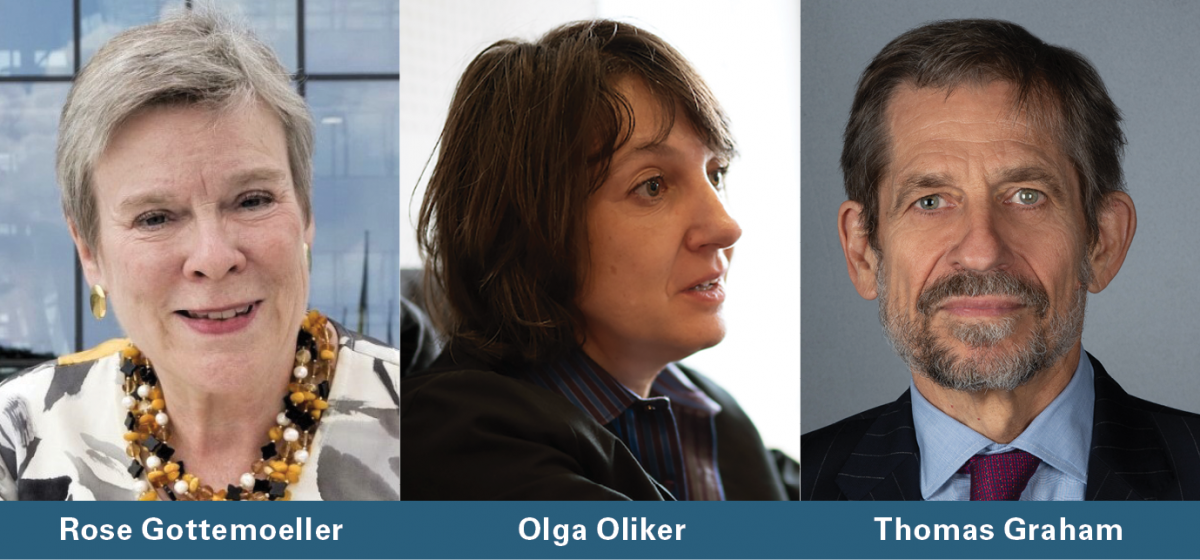 ACT: What do you see as the core of the Russian-Ukrainian crisis? What led Russia to demand security guarantees?
ACT: What do you see as the core of the Russian-Ukrainian crisis? What led Russia to demand security guarantees?
ROSE GOTTEMOELLER: Vladimir Putin’s ego. I’m only slightly kidding.
THOMAS GRAHAM: From the Russian standpoint, this is really a question that concerns the post-Cold War settlement back in the 1990s that Russia now believes was imposed on it at a time of extreme strategic weakness in Russia. Of particular concern has been the expansion of NATO eastward across the continent, beginning with the initial invitations issued in 1997 and threatening core principles of Russian security going back decades if not centuries. Russia has sought its security in strategic depth and in buffer zones. They don’t like the idea of a military-political alliance, created to contain the Soviet Union, pressing up against its borders. So while in the United States we talk about a Ukraine crisis, from the Russian standpoint this is a crisis in European security architecture, and the fundamental issue they want to negotiate is the revision of European security architecture as it now stands to something that is more favorable to Russian interests.
OLGA OLIKER: I do think that at the core of this is a European security order that is out of date [and] that does not meet the needs of security as it has developed. Part of that is we have very different views of what it means to be secure in Europe, what sovereignty means in Europe. Why we’ve been unable to adapt the system to current needs is because Moscow on the one hand and Western countries on the other have these misaligned views of what it means to be secure.
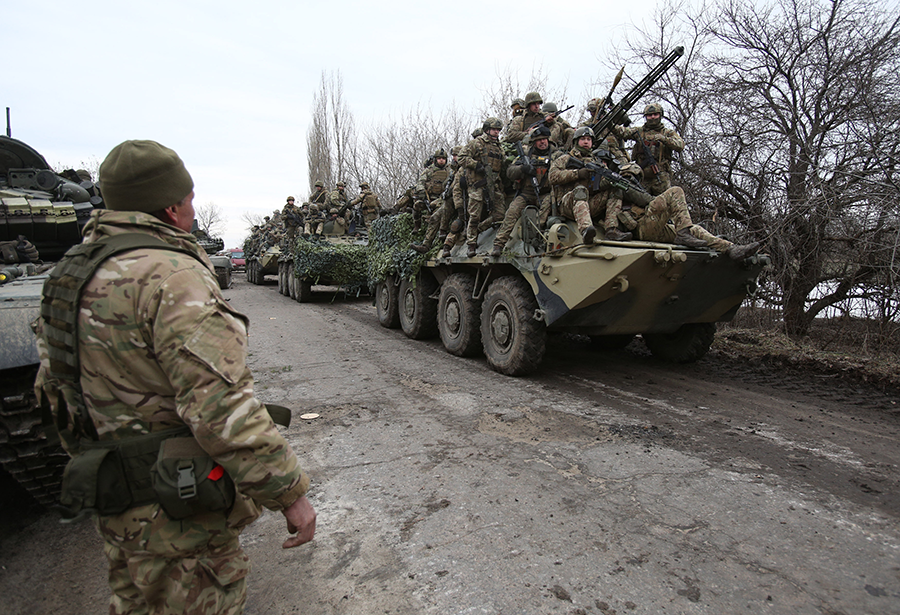 GOTTEMOELLER: There is a major economic aspect of this, and that starts at the crisis in 2014 over Ukraine’s association agreement with the European Union. It had nothing to do with NATO. Ukrainians are heading to Europe in terms of its culture, its democratic practices, so it is also about Ukraine eventually joining the EU. For me, it’s a bit artificial the way Putin has created NATO as the enemy because NATO all along, and up to the invasion of Ukraine in 2014, was trying to promulgate a partnership with Russia based on the Rome Declaration of 2002 that Putin himself signed and included a wide range of pragmatic projects. They got increasingly difficult to implement in the years running up to 2014. But there were still some significant practical projects going on, like the European Airspace Initiative, right up to the invasion of Crimea.
GOTTEMOELLER: There is a major economic aspect of this, and that starts at the crisis in 2014 over Ukraine’s association agreement with the European Union. It had nothing to do with NATO. Ukrainians are heading to Europe in terms of its culture, its democratic practices, so it is also about Ukraine eventually joining the EU. For me, it’s a bit artificial the way Putin has created NATO as the enemy because NATO all along, and up to the invasion of Ukraine in 2014, was trying to promulgate a partnership with Russia based on the Rome Declaration of 2002 that Putin himself signed and included a wide range of pragmatic projects. They got increasingly difficult to implement in the years running up to 2014. But there were still some significant practical projects going on, like the European Airspace Initiative, right up to the invasion of Crimea.
From NATO’s perspective, they were trying to make it work for Russia. I won’t say that everybody inside NATO was equally trying to make it work; the former Warsaw Pact states were nervous and anxious about Russia’s engagement and involvement in NATO and suspicious about it undermining NATO. But from a NATO policy perspective, the alliance was trying to make its partnership with Russia work. So, that’s what is being missed in the discussion now. Everybody seems to accept at face value that NATO is a problem for Putin. He created the problem in my view, and what this is more about is Ukraine having a healthy economic relationship with the EU; Ukraine suddenly having more of a future than Russia in a way.
OLIKER: I think there’s a lot of truth to that in terms of the facts, the realities of Ukraine’s evolution [and] Russia’s own economic system. But it is also important not to discount the extent to which Russia has consistently viewed NATO as a threat even as NATO was making overtures and saw itself as working to improve relations with Russia, to improve security. Throughout this process, Russia was always pushing back. The Russian view that NATO is an alliance against Russia, that the United States is a threat, and that NATO and the EU work for the United States one way or another is false but consistent, and that is a driver of Russia’s vision. It is interesting that none of the demands we’ve seen in these Russian draft treaties have anything to say about the EU. In fact, there is about as much risk of the Ukraine joining the EU anytime soon as of their joining NATO anytime soon. Neither of these institutions has any plans to incorporate Ukraine, and the EU is going through its own identity crisis.
For Russia, there is this visceral understanding of Ukraine as naturally its own, and that is crucial to Russia’s self-image and its view that Ukraine, however independent or not independent it is, be aligned with Russia. This is something they created for themselves. You invade a country, you annex a chunk of it, [and] shockingly, it’s not going to be as prone to being aligned with you. But there you have it, and they view this as NATO doing it to Russia rather than Russia doing it to itself, and they see this as a threat. The logic doesn’t quite work, but I do believe that they believe this.
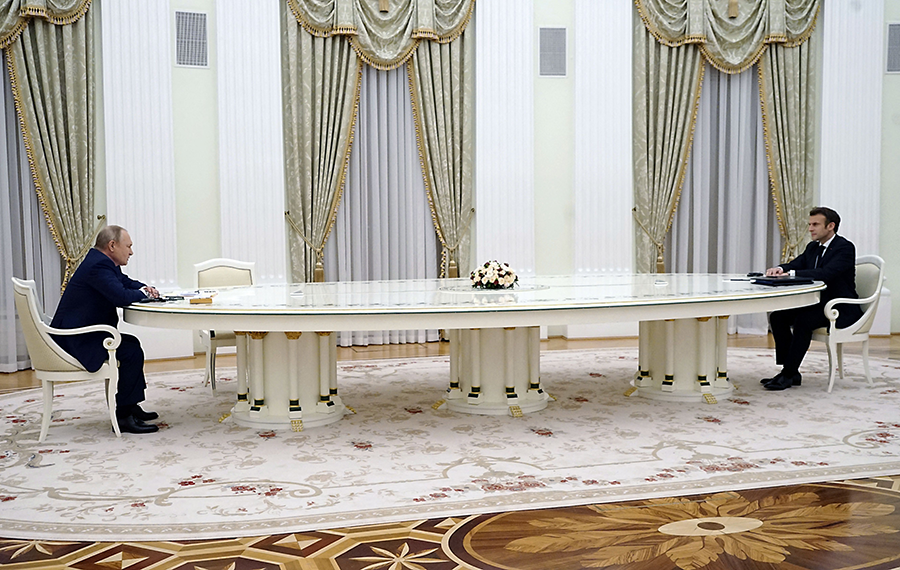 GOTTEMOELLER: I don’t disagree, but who are the Russians in this case? I think there are different views out there. There are Russians, [Andre] Kortunov [director-general of the Russian International Affairs Council], some retired military and KGB senior officers who are saying, “Is it really such a good idea to be heading in this direction of a war, invasion of Ukraine?” They are also saying, “Do we really want to abandon our Western-facing objectives and throw ourselves into the arms of China, is that a good idea?” The Russians aren’t monolithic on this. There always has been a debate of the Westernizers versus the Slavophiles. In this case, the Westernizers are those who still see the necessity of links to Europe for economic, cultural, [and] traditional reasons and because people like to send their kids to school in Europe versus those who say to heck with Europe, to heck with the West, we’re throwing ourselves into the arms of the Chinese.
GOTTEMOELLER: I don’t disagree, but who are the Russians in this case? I think there are different views out there. There are Russians, [Andre] Kortunov [director-general of the Russian International Affairs Council], some retired military and KGB senior officers who are saying, “Is it really such a good idea to be heading in this direction of a war, invasion of Ukraine?” They are also saying, “Do we really want to abandon our Western-facing objectives and throw ourselves into the arms of China, is that a good idea?” The Russians aren’t monolithic on this. There always has been a debate of the Westernizers versus the Slavophiles. In this case, the Westernizers are those who still see the necessity of links to Europe for economic, cultural, [and] traditional reasons and because people like to send their kids to school in Europe versus those who say to heck with Europe, to heck with the West, we’re throwing ourselves into the arms of the Chinese.
OLIKER: Those voices that see Russia as European, that see Russia’s future in cooperating with Europe, are not the voices that the government is listening to. Even among those voices, there are two factors to keep in mind. One is that they do continue, for the most part, to see NATO as fundamentally an anti-Russian institution. Even the most liberal Russian has a very difficult time visualizing a Ukraine that isn’t aligned with Russia. Part of the problem is that very few Russian men, especially, have visited Ukraine since 2014, so they are not familiar with some of the changes that have taken place in that country. My point is that even the most liberal, pro-Western Russian thinks of Ukraine as an appendage to Russia, and that has become unacceptable in Ukraine. It has also become quite unacceptable to a variety of European countries to give that to Russia.
ACT: This Russian animus toward NATO and the West has been going on a long time. Does Putin making a big issue of it now seem artificial?
GRAHAM: In 1999 and 2000, Russia really didn’t have the capability to push back. Russia believes now that it is in much better shape, certainly from a military standpoint, probably from the standpoint of political stability and economically, to push back. Also, the West is in greater disarray now than it has been in many years. Beyond that, there are things over the past year that concern Moscow. The Ukrainian president, Volodymyr Zelenskyy, has moved actively against what he sees as pro-Russian forces inside Ukraine, putting under house arrest Viktor Medvedchuk, who served in the Ukrainian government at one point but is seen as very close to Putin and a representative of pro-Russian forces in the Ukrainian system. They closed down three TV stations they claim were broadcasting Russian propaganda. Zelenskyy also in the past year has pushed actively for NATO to make some early-term decision on NATO expansion into Ukraine. He tried to put on the international agenda the question of Crimea, which had not been at the center of discussion on European issues over the past several years.
Since Ukraine was granted the enhanced opportunities relationship with NATO, Russia has seen a much more active NATO presence in Ukraine. The United States is there with instructors. The United Kingdom has been on the ground. We’ve done annual exercises that are more ambitious. The Russians saw this as a threat. Finally, Putin wanted to see how the new Biden administration would deal with Russia. He didn’t want to be written off as a significant global actor. I think the Russians resented the national security strategy guidelines that the administration issued in March 2021, which basically said Russia is a destructive element on the international stage and China is what we’re really concerned about. So, from the Kremlin standpoint, they wanted to make sure Russia was on the agenda in this administration. We had the chaotic exit from Afghanistan, which created some sense of perhaps now is a time to push so we can get a favorable decision out of the Biden administration. Finally, you have the energy crisis in Europe this year, which gave Russia some leverage. So a host of things came together that led the Kremlin to decide this is the moment to throw down the gauntlet about NATO expansion.
ACT: Are you somewhat sympathetic to the Russian side?
GRAHAM: When you’re doing an analysis, you shouldn’t be sympathetic. I am trying to describe what is driving the Russians at this point, and that’s important in the United States if we’re going to develop a policy that advances our interests and defends our principles. I don’t find this unusual. Any major power that felt that a peace was imposed on it will seek to revise that peace when it’s strong enough to do that. We saw Germany do that after the Versailles Treaty was imposed on it in 1919. That said, obviously there are certain things the Russians have done that are problematic from our standpoint. Even if it doesn’t invade Ukraine, and my sense is that is not the first option the Kremlin is thinking about at this point, they have used the threat of force in coercive diplomacy to put this on the agenda. That is problematic. It does lead to questions of how do we deal with this in a way that will resolve the crisis but not encourage Russia to use coercive diplomacy in the future to try to advance its interests. That’s where diplomacy comes in, how do we do this in a way that accommodates Russia but doesn’t undermine our interests or jeopardize our core principles.
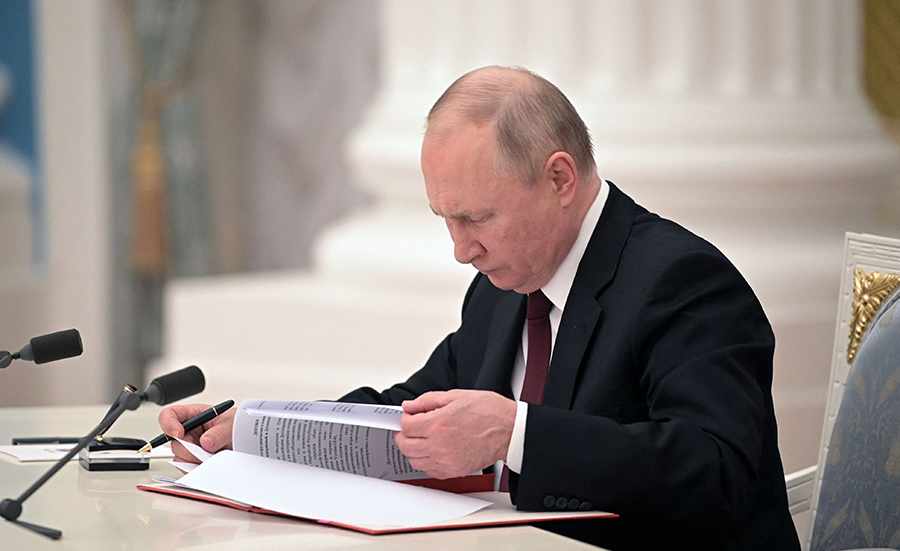 ACT: What do you think is Putin’s goal? His foreign minister has called for “radical changes” in European security, among the litany of Russian demands.
ACT: What do you think is Putin’s goal? His foreign minister has called for “radical changes” in European security, among the litany of Russian demands.
OLIKER: What I hope he wants is as much as he can get. Then, when you get to the talks, you can actually negotiate something. What I fear he wants is to prove to the United States and NATO that he cares more about Ukraine and possibly all of European security than they do, that none of the rest of them will use force but he will, and then they’re going to have to reckon with him. I think that would be a horrible misjudgment on Moscow’s part if they really think that is what is going to happen.
GOTTEMOELLER: This hasn’t been emphasized, but this is also about Putin’s domestic situation and trying to position himself for a successful transition. Like most autocrats, he cannot designate a successor for fear that he’ll end up getting knocked off by his successor before time. I think he is trying to also shape Russian politics as the ultimate strongman, the ultimate all-wise, all-powerful leader, and show he is tactically adept. That means he can also handle the domestic political environment. It’s a huge roll of the dice for Putin, whether he can come out of this successfully. Some ways we would not be happy with, some ways we can work with, particularly if Russia heads in the direction of really useful negotiations that produce good results for Russia, of course, but also for NATO and the United States. But I also think he’s trying to position himself as he turns 70 this October, to say, let’s figure out with his barons, his power structure the next moves in terms of governance in Russia, but “don’t mess with me in the meantime.”
ACT: There are specific Russian, U.S., and NATO proposals on the table. Do you see convergence? What is likely to result from talk of realigning or reforming the security architecture of Europe?
GRAHAM: Certainly, these are negotiable at this point, in part because if you look at the draft treaties that Russia presented publicly, see the U.S. and NATO response, there is an agreement that we need to negotiate new arms control measures, confidence-building measures, if we’re going to enhance security in Europe for everybody. So, we’re not going to call it the [Conventional Forces in Europe] CFE Treaty, but certainly some of the principles that informed that treaty would be appropriate today. I think the United States and NATO would be willing to undertake obligations not to deploy certain types of weapons systems or even concentrations of military forces in a certain zone along the Russian-NATO frontier. We’ll see how much flexibility there is on the Russian side.
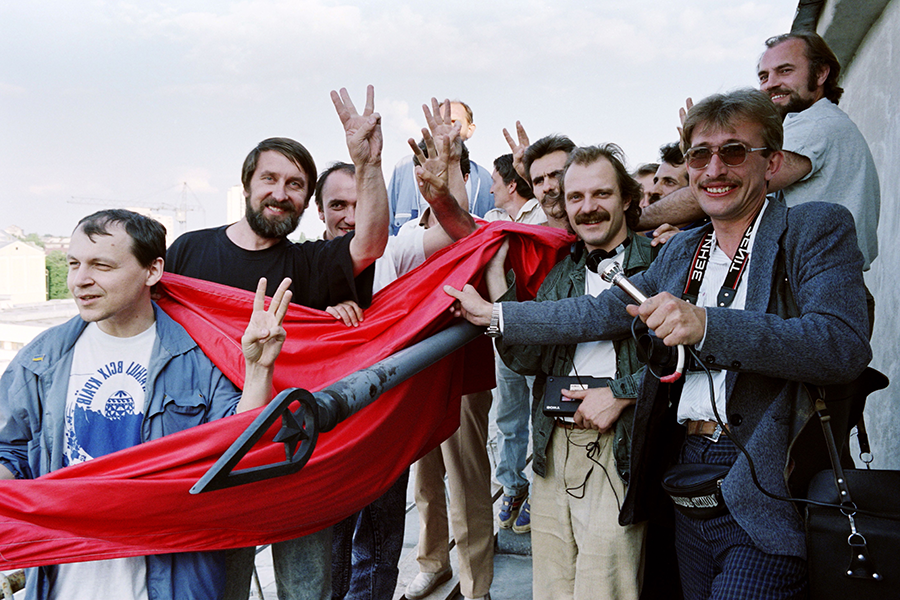 In the NATO-Russia Founding Act of 1997, NATO pledged it would not deploy “substantial permanent combat forces” in new member states. We adhere to that up to this point, but we may be able to define that with greater clarity. This would require reciprocity on the Russian part, which means they would have to undertake not to deploy their forces within a certain distance of the border, which means they will put limitations on their ability to move their own forces and staff on Russian territory. The Kremlin standpoint is that Russia has every sovereign right to deploy its forces anywhere it wants to on its sovereign territory and that shouldn’t be a problem for any other country [because] it’s not threatening. That said, if you’re planning on invading a country, you generally concentrate your forces along the border, right? So any concentration of forces along the border does raise legitimate concerns in neighboring countries as to what your intentions actually are. Can we negotiate something like that? I think the answer is yes, but it’s going to be difficult because it will require concessions on both sides. Reciprocity is something the United States is focused on. We believe Russia violated the INF [Intermediate-Range Nuclear Forces] Treaty. That’s the reason we withdrew or at least one of the reasons we withdrew. Russia had its own grievances about our missile defense sites in Poland and Romania.
In the NATO-Russia Founding Act of 1997, NATO pledged it would not deploy “substantial permanent combat forces” in new member states. We adhere to that up to this point, but we may be able to define that with greater clarity. This would require reciprocity on the Russian part, which means they would have to undertake not to deploy their forces within a certain distance of the border, which means they will put limitations on their ability to move their own forces and staff on Russian territory. The Kremlin standpoint is that Russia has every sovereign right to deploy its forces anywhere it wants to on its sovereign territory and that shouldn’t be a problem for any other country [because] it’s not threatening. That said, if you’re planning on invading a country, you generally concentrate your forces along the border, right? So any concentration of forces along the border does raise legitimate concerns in neighboring countries as to what your intentions actually are. Can we negotiate something like that? I think the answer is yes, but it’s going to be difficult because it will require concessions on both sides. Reciprocity is something the United States is focused on. We believe Russia violated the INF [Intermediate-Range Nuclear Forces] Treaty. That’s the reason we withdrew or at least one of the reasons we withdrew. Russia had its own grievances about our missile defense sites in Poland and Romania.
The whole dance around ending the INF Treaty was undertaken to cast blame on the other side for the demise of the treaty, which both countries actually wanted to get out from under. Now in the current circumstances, in the interests of European security, there’s some interest in reviving this treaty, but limited to Europe. If we’re going to negotiate that, the Russians are going to have to answer our concerns about the missile system that they’ve already deployed. We’re going to have to answer their questions about our missile defense systems. We’ll see over the next several weeks whether there is the political will to find the technical fixes that will allow us to come to an agreement that we will not deploy land-based intermediate-range nuclear forces or nuclear-capable forces in the European theater. Then there are notifications of military exercises, rules of conduct to avoid dangerous incidents at sea and in the air. All those things are negotiable. I think both sides agree they’re important to European security.
OLGA: The analyst, Gabriela Rosa Hernandez, sent me an email on the Russian response of February 17, which she summarized as follows: “There’ll be a military technical response if you keep ignoring us, but we won’t invade Ukraine. We’re not going to negotiate confidence-building measures or arms control deals unless we address the European security architecture and Ukraine’s NATO membership. It’s a package, not a menu.”
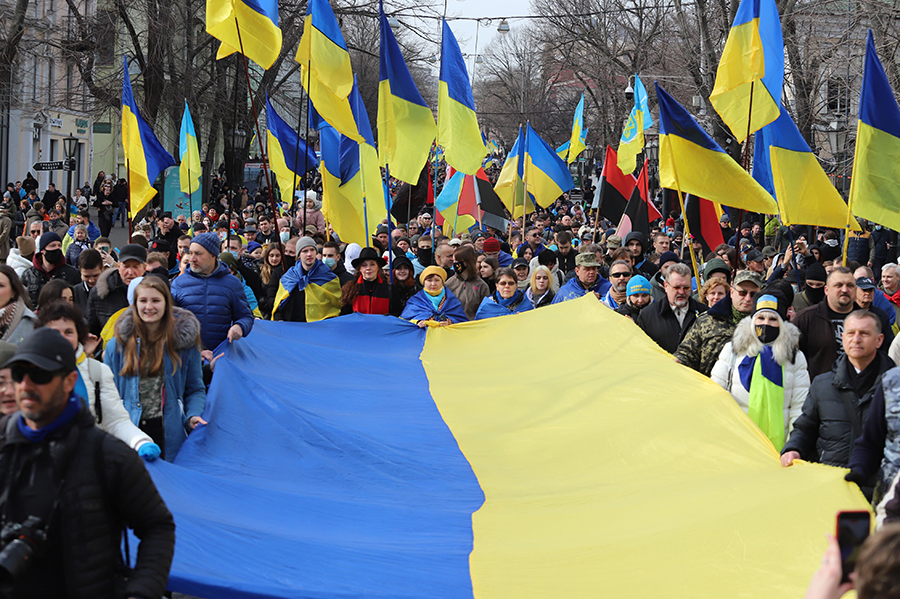 It’s not a good Russian response because it is very hard-line. I can see points of overlap. Everybody at this point is okay with a European intermediate-range nuclear forces deal, even if we might have questions about its military usefulness, since the United States isn’t planning to do this anyway. I think the mutual inspections, exercise limits, and things like that, you can do these things. One big disconnect is the Russians want the limits where it’s Russian, and perhaps Belorussian, territory up against NATO territory. When it comes to Ukraine, the Russians want the ability to build up forces all around Ukraine, put a bunch of ships in the Black Sea with missiles on them, and threaten Ukraine. There is no new European security architecture deal, I don’t think, that doesn’t also take into account the security of countries like Ukraine one way or another. If the Russians really do push this “it’s a package, not a menu” story, I mean good luck with negotiating. You can’t negotiate one big package like this quickly.
It’s not a good Russian response because it is very hard-line. I can see points of overlap. Everybody at this point is okay with a European intermediate-range nuclear forces deal, even if we might have questions about its military usefulness, since the United States isn’t planning to do this anyway. I think the mutual inspections, exercise limits, and things like that, you can do these things. One big disconnect is the Russians want the limits where it’s Russian, and perhaps Belorussian, territory up against NATO territory. When it comes to Ukraine, the Russians want the ability to build up forces all around Ukraine, put a bunch of ships in the Black Sea with missiles on them, and threaten Ukraine. There is no new European security architecture deal, I don’t think, that doesn’t also take into account the security of countries like Ukraine one way or another. If the Russians really do push this “it’s a package, not a menu” story, I mean good luck with negotiating. You can’t negotiate one big package like this quickly.
GOTTEMOELLER: One of Putin’s early-warning shots was to say, “I don’t want to get into the dead-end swamp of endless negotiations.” But now, if they are taking this position that it’s a package and not a menu, that is a recipe for endless negotiations. Speaking from the perspective of a negotiator, I can say that you have to carve off doable do’s where you can quickly see some momentum building and you work through it piece by piece. That’s why, to my mind, that was Putin’s offer in the first place, that we take intermediate ground-launched missiles out of Europe. Although he doesn’t admit the [Russian] 9M729 is a missile that is flying to intermediate range, he was willing to say, “We’ll take it out as a goodwill gesture and put in place monitoring and verification.” That was his so-called moratorium proposal. Now, we’re ready to say, “Yes, let’s do this, and let’s do it quickly and figure out what the monitoring and verification would be.” That is where there could be quick progress, and it would lend momentum to these further things that we want to get done. But if they’re saying, “You’ve got to agree to our whole package and talk about our whole package,” it’s like they’re saying no to real diplomacy.
ACT: Is there a solution to Russia’s opposition to Ukrainian membership in NATO?
GRAHAM: The stumbling point at this point is the issue of NATO expansion eastward into the former Soviet space. The Russian position is never. They want legally binding guarantees about that. The U.S. position is that NATO has an open door and sovereign states have the right to decide who they’re going to associate with for security, political, and other purposes. At the end of the day, this issue has to be put on the table. The question is, How do you bridge the gap between those two positions and come up with some reasonable solution that satisfies minimal security requirements for Russia, but also allows the United States to say it hasn’t compromised its core interests or its core principles? I think the Ukrainians understand NATO membership is a distant possibility for them. So you would think that, given what everybody will tell you in private, we ought to be able to find a clever diplomatic solution to this problem. This is where the idea of a moratorium comes up. My guess is, eventually, we’re going to get there.
In some ways, the simplest solution for NATO and the United States would be for Ukraine to decide that it didn’t want to join NATO, take it out of the constitution, and reinsert a provision about nonalignment. That may be where we end up. But I think the United States, as a major power, ought to simply be prepared to say that we’ve looked at the situation, [that] we don’t believe Ukraine is going to be ready for decades, and that a moratorium is the best way of doing this at this point, then allow the Ukrainians the space to sort out how they feel about that and what they want to do going forward, as opposed to pressuring them to make a statement that takes us off the hook.
ACT: Should negotiations on European security and arms control take place within the
U.S.-Russian strategic stability dialogue format?
GRAHAM: My preference would be for a separate group to work on these questions of European security. There’s not a strict overlap between those people who deal with security architecture and those who are focused and should rightfully be focused on arms control negotiations, developing a follow-on treaty for New START, which expires in four years. You could do that under the umbrella of a strategic stability dialogue by setting up a separate working group with different individuals to focus on this.
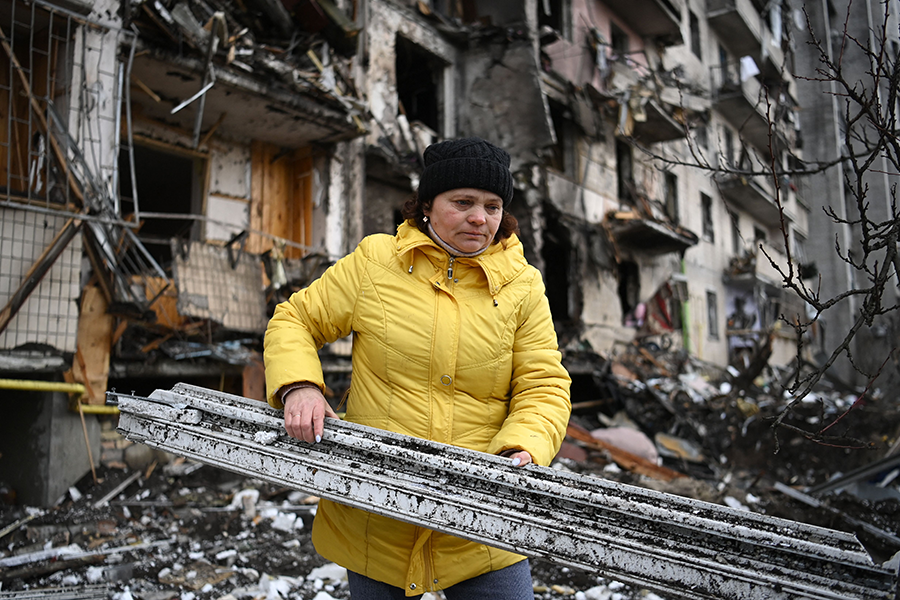 While it’s important to have this type of structure, we also need a genuinely confidential back channel where we can discuss what are very sensitive issues. Much of the dialogue over the past several months has been conducted in public. To a great extent, the Russians are to blame for that by publishing those treaties 24 to 48 hours after they had presented them to the United States. It was clear our response was going to be leaked at some point. But these are such sensitive issues, you can’t negotiate them seriously in the public glare because resolution will require backing away from stated positions. That’s very difficult to do given the political context in the United States. It’s also difficult to do on the Russian side. So if you’re really serious, you have to have a platform that is protected from the public glare, where serious people can get together and discuss very sensitive issues that will require difficult trade-offs. You have to do this in confidence and then present the total package to the public for debate. Any element of a compromise solution can be debated to death. When you see the whole package and how pieces fit together, you have a different assessment.
While it’s important to have this type of structure, we also need a genuinely confidential back channel where we can discuss what are very sensitive issues. Much of the dialogue over the past several months has been conducted in public. To a great extent, the Russians are to blame for that by publishing those treaties 24 to 48 hours after they had presented them to the United States. It was clear our response was going to be leaked at some point. But these are such sensitive issues, you can’t negotiate them seriously in the public glare because resolution will require backing away from stated positions. That’s very difficult to do given the political context in the United States. It’s also difficult to do on the Russian side. So if you’re really serious, you have to have a platform that is protected from the public glare, where serious people can get together and discuss very sensitive issues that will require difficult trade-offs. You have to do this in confidence and then present the total package to the public for debate. Any element of a compromise solution can be debated to death. When you see the whole package and how pieces fit together, you have a different assessment.
ACT: How does this conflict with Russia end? Is there a chance it could escalate to use of nuclear weapons?
GOTTEMOELLER: I don’t think it will escalate to the nuclear level, but I do think we could get into a serious kinetic conflict that would be bolstered by serious and continuing hybrid attacks. There’s a kind of mixed bag here of hybrid action, cyberattacks; there’s [a] very strong misinformation campaign and then kinetic action gets added on top. Perhaps what I fear most is the spillover that would affect NATO allies, and that’s the reason why the Biden administration has bolstered troops in Poland. Other NATO countries are sending some troops forward to help deter and defend in those states directly bordering on Russia and Belarus. No NATO troops will be involved in Ukraine per se, but I do worry about spillover into NATO countries. We already see spillover on the hybrid side. There are constant cyberattacks on NATO headquarters and on NATO countries individually.
OLIKER: I don’t think this conflict has a real nuclear risk. I think the next conflict, the next crisis does. This is my concern that however this ends, if it does not end with everybody at the negotiating table thinking about how to build a more secure Europe and staying at that negotiating table, in the next crisis, everybody comes to that table saying we failed in Ukraine. This time we have to do more. This time we have to push harder, and by everybody I mean both on the Russian side and on the NATO side. There I start seeing risks of escalation that involve NATO member states, and there I start seeing risks of escalations where the Russians are thinking that there are going to be attacks on the Russian homeland, and that’s where you start getting into nuclear use areas.
But I don’t want to end on that note. For a lot of years, one of the things we’ve been saying, those of us who’ve been trying to push for some conventional arms control mechanisms and not seen much progress, is that it might take a crisis to get everyone to come to their senses and realize how important it is to have these conversations. If this could be that crisis, that would be a huge silver lining. The problem is that it really is a crisis, so it could go in the other direction.
GOTTEMOELLER: Yes, to close as well on a bit more of a positive note, when I was assistant secretary for arms control over 10 years ago, I used to call conventional arms control the redheaded stepchild of the arms control agenda. Any attempts that we made at the time to push forward in that arena, there were a lot of people in Washington who were just not interested or liked the way things were and felt why mess with conventional arms control at all. Then things just keep getting worse. Again, I lay the blame in part at the Russian door. They ceased to implement the CFE Treaty. They put roadblocks in the way of modernizing the Vienna Document; they played a bit fast and loose with implementation of the Open Skies Treaty. But I also think there was a lack of energy and interest on our side. So now there’s energy and now there’s interest. Let’s hope the Russians pay attention. It’s an opportunity we need to grasp.
ACT: Should the primary focus be conventional arms control and not nuclear weapons generally or withdrawal of U.S. nuclear weapons from Europe?
GOTTEMOELLER: From a NATO perspective, that will be off the table. The NATO nuclear mission in Europe is not even a couple hundred warheads. It’s a very small number, but it’s the essential glue that links the NATO alliance to the central strategic deterrent of the United States. But I don’t want to see the strategic stability talks abandoned as we switch our focus to trying to right the conventional architecture in Europe. We have to do both. We also need to be sitting down now to begin to think about how to replace New START.
OLIKER: I think we can do both. Honestly, if we’re willing to sit down for the conventional conversation, we are surely willing to sit down for the nuclear conversation. It won’t be easy. All of these issues—Russia’s nonstrategic nuclear weapons arsenal, missile defense that has frozen things for so long—they’re still there. A real negotiation has to reckon with all of that, and it is in everyone’s interest that it does. However, doing so becomes that much more difficult in the face of escalation.
